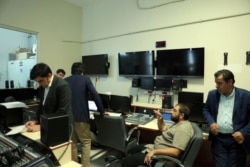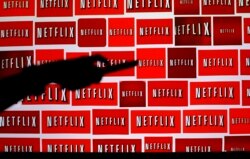In Turkey, sweeping powers have come into force to control internet broadcasting, exposing emerging independent news outlets and entertainment giants like Netflix to government censors.
Under a new law taking effect this week, online broadcasters will be regulated by state broadcasting watchdog RTUK, which is controlled by allies of conservative President Recep Tayyip Erdogan.
Critics predicted more government censorship under the law to catch up with the increasing number of media outlets moving operations online.
"They will target radio and TV broadcasting over the internet," said law professor Yaman Akdeniz of Istanbul's Bilgi University. "As well as video-on-demand services under a dubious licensing regime, which will, in reality, become yet another censorship tool for the government."
International media watchdogs say Erdogan already has an iron grip on terrestrial broadcasting. In response, Turkey has witnessed a surge of independent digital news, with many prominent Turkish journalists who have been purged from mainstream TV and newspapers moving to online news outlets.
"Erdogan realizes the media he controls is no longer watched or read in Turkey," said analyst Atilla Yesilada of the consulting firm Global Source Partners.
"Eighty-five percent of Turkish households are now connected to the internet, and 70 percent of youth generation get their entire, entire information from social media and the internet," Yesilada said.
Content controls
Online broadcasters now will need an RTUK license, at an annual cost of 10,000 Turkish lira ($2,000) for radio and a 100,000 lira for TV ($2,0000).
The broadcasters also come under the same strict content controls that make government criticism difficult, if not impossible.
Failure to comply with RTUK rules can result in the blocking of the site. With Turkish authorities already blocking around 200,000 internet sites, the country ranks alongside countries like Iran and China with pervasive internet censorship.
Some question whether the new measures can be effective.
"It's technically impossible to enforce," said Yesilada. "There is no way you can shut off these alternative sources. It doesn't suffice shut down a dissident site or YouTuber. He will open a new account, he will announce it on Twitter.
"You have shut down the entire social media, and that is totally unacceptable, including to AKP (Turkey's ruling party) supporters," he said.
Turkish internet users already have a reputation for tech-savviness and the widespread use of tools to circumvent site bans.
International sites
It is not clear whether the new regulations will affect established international news sites broadcasting online in Turkish.
Agencies such as Britain's BBC, Germany's Deutsche Welle, France24 and the Voice of America have stepped up their broadcasting in response to growing local demand. In April, the four agencies launched a joint site on YouTube to provide a range of news and sociopolitical content that is not filtered by the government.
"It is not clear from the regulations how (the government) will use the new power," said Akdeniz, who has filed many cases challenging internet controls in international courts. "So, (foreign news organizations) could be affected, but we will see in due course."
The new regulations do extend to online international entertainment providers.
RTUK president Ebubekir Sahin said Tuesday on Twitter that Netflix has applied for a license along with 600 institutions that include local streaming services.
Turkey is one of Netflix's fastest-growing markets. In three years, the service amassed 1.5 million subscribers, or about 10 percent of households, partly because it escaped the content censorship applied to mainstream media.
Policing indecency
Religious conservatives form much of Erdogan's base, and analyst Yesilada said the government now wants to expand its conservative agenda to the internet.
"I have held some conversation with industry insiders. It's gay liberal lifestyles that is driving this reform," Yesilada said.
"Remember we are talking a censorship board which, if it detects even the slightest sign indecency in a music video, it bans it on all channels," he said.
Earlier this year, RTUK caused an uproar when it demanded removal of an entire scene from the Oscar-winning La La Land because it was set in a bar. RTUK has yet to publish guidelines for online entertainment.
Akdeniz said controls are destined for online providers like Netflix.
"If it does comply with the licensing control regime and blur images like smoking drinking alcohol even kissing that would be fundamentally unlike Netflix," he said. "I don't think anyone would use that type of content."
Netflix has confirmed that it is negotiating with RTUK over parental controls. But with terrestrial broadcasters losing viewers to the likes of Netflix, they will likely demand similar content restrictions on online entertainment providers.







